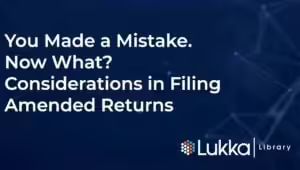Authors: Lisa Zarlenga, John Cobb, Steptoe
This article is presented for general information only and may not be relied upon as legal or tax advice. Interested persons should seek advice from legal counsel in applying the considerations discussed to their own situations.
******
I. Overview
U.S. taxpayers and their advisors have had a number of challenges in determining the proper tax treatment of cryptocurrency investments and transactions. In many areas—token issuances, airdrops, forks, like-kind exchanges, staking rewards, and others—uncertainty generally has been the name of the game. As more guidance comes out from the Treasury Department (“Treasury”) and Internal Revenue Service (the “IRS”), taxpayers may discover that the positions taken on their past tax returns do not line up with current guidance. In addition, especially in earlier years, taxpayers may have been unaware of the initial guidance regarding the treatment of convertible virtual currencies as property that Treasury and the IRS issued in 20141 and may have improperly reported mining rewards, cryptocurrencies received as compensation, or capital gains from cryptocurrencies used to pay for goods or services on their tax returns.
What should you do when you discover that tax returns that you filed in previous years contain an error? The primary tool to address such errors is an amended return.2 However, as described in more detail below, filing an amended return is a choice and not a legal obligation. A number of different considerations come into play in deciding whether or not to file an amended return. Some of the most significant considerations are described below.
II. No Legal Obligation to Amend
The first thing to understand is your legal obligations. While Treasury and the IRS encourage taxpayers who discover and error on a past return to file an amended return, there is no legal obligation to do so.
The Internal Revenue Code does not explicitly provide for a taxpayer’s filing or for the IRS’s acceptance of an amended return. Instead, the concept of an amended return appears only in Treasury regulations. These regulations state that taxpayers “should” file an amended return when they “ascertain” that there has been an error, but do not state that taxpayers “must” or “shall” file such an amended return.3 In general, the Internal Revenue Code, regulations, and case law do not impose a duty on taxpayers to file an amended return when they discover that an error was made in good faith on a past return.4
A taxpayer may not, however, take advantage of an error on a past return in reporting income on a current return.
III. Why File an Amended Return?
If there is no legal obligation to file an amended return, why would taxpayers amend their returns? The three primary motivations for filing an amended return are receiving a refund, penalty protection, and civic responsibility.
First, taxpayers may wish to file a claim for refund when they discover that their error actually meant that they overpaid taxes on a past return. In such a case, if the statute of limitations for a refund claim has not lapsed, the taxpayer may file an amended return and claim a refund from the IRS.
In general, a refund claim must be filed within three years from the time a return was filed or two years from the time the tax was paid, whichever expires later.5 For example, if you filed your 2018 tax return on April 15, 2019, you generally would have until April 15, 2022 to file an amended return and claim a refund. This period may be extended in certain cases, such as when an individual is unable to manage his or her financial affairs by reason of a medically determinable physical or mental impairment.6
Even if you are entitled to a refund, there may be reasons to not file an amended return. The cost and time expended may not be worth the amount of the refund. In addition, should you decide to file an amended return, you must ensure that the amended return is accurate and complete. That is, you have an obligation to correct any other errors that appeared on the return and not to selectively correct only some errors. Your amended return is filed under penalties of perjury, and requires you to state that it is true, correct, and complete to the best of your knowledge.
A taxpayer may also wish to file an amended return for protection from certain penalties. The impact of filing an amended return on penalties is discussed in the next section.
Additional considerations may apply for taxpayers that are treated as partnerships for tax purposes. For example, under the new centralized partnership audit regime, partnerships generally cannot file amended returns, but rather have to file Form 8082, Notice of Inconsistent Treatment or Administrative Adjustment Request to correct items on an original partnership return.7 By default, any additional tax liability, including interest and penalties, must be paid by the partnership under the new rules, although the partnership may elect to push out tax liability to its partners and, in some cases, may elect out of the new centralized audit regime entirely.8
Finally, although not necessarily a legal consideration, a taxpayer that discovers an error may wish to file an amended return out of a sense of civic responsibility to pay the full amount of taxes owed. Some feel that, as Supreme Court Justice Oliver Wendell Holmes, Jr. once said, “Taxes are what we pay for a civilized society.”9
IV. Effect of Filing an Amended Return on Tax Penalties
A. Criminal Penalties and Fraudulent Returns
The Internal Revenue Code sets up a variety of different penalties that may apply to taxpayers who pay less tax than they owe, depending on their degree of culpability. First, taxpayers who “willfully” attempt to evade taxes, fail to pay taxes, fail to file required returns, or file fraudulent returns can face criminal penalties, including the possibility of substantial periods of incarceration.10 Taxpayers filing fraudulent returns can also face a civil fraud penalty of 75 percent of the portion of any underpayment of tax that is attributable to fraud.11
In general, the determination of whether a penalty for fraud should be assessed does not take into account a taxpayer’s post-filing knowledge and behavior, except to the extent that this knowledge or behavior sheds light on the taxpayer’s knowledge or behavior when filing the original return.12 Filing an amended return, in appropriate circumstances, might be considered as evidence of a lack of willfulness. However, in at least some cases, courts have held that “the very act of filing the amended return of admittedly unreported income may be decisive in the absence of satisfactory explanation of the delinquency,” especially where an amended return is filed only after a taxpayer has knowledge of an investigation.13
B. Accuracy-Related Penalties and Qualified Amended Returns
Taxpayers filing nonfraudulent returns can also face so-called “accuracy-related penalties.” These penalties include a 20-percent penalty on the portion of any underpayment attributable to negligence or disregard of rules or regulations or any substantial understatement of income tax.14
Negligence includes any failure to make a reasonable attempt to comply with the provisions of the internal revenue laws or to exercise ordinary and reasonable care in the preparation of a tax return.15 “Rules and regulations” for this purpose includes both the IRS guidance released in 2014 (Notice 2014-21) and the guidance on the treatment of hard forks released in 2019 (Rev. Rul. 2019-2416).17 A taxpayer generally would be treated as disregarding this guidance if the taxpayer does not exercise reasonable diligence to determine the correctness of a return position that is contrary to the guidance.18 Negligence also includes any failure by the taxpayer to keep adequate books and records or to substantiate items properly.19 A taxpayer may be able to avoid a negligence penalty if the taxpayer can show a reasonable basis for the position, which includes a position reasonably based on one more authorities, or the taxpayer has a reasonable basis for the tax treatment of an item and adequately discloses the facts regarding the item’s treatment.20
In general, there is a substantial understatement of income tax for any taxable year if the amount of an understatement of tax for the taxable year exceeds the greater of 10 percent of the tax required to be shown on the return for the taxable year or $5,000.21 A taxpayer may be able to avoid a penalty due to a substantial underpayment of tax if the taxpayer can show substantial authority for the position causing the understatement or has a reasonable basis for the tax treatment of an item and adequately discloses the facts regarding the item’s treatment.22
In the absence of fraud, a taxpayer generally may avoid accuracy-related penalties by filing a “qualified amended return.” This is because, for the purpose of computing these penalties, the amount shown as the tax by the taxpayer on his return is treated as including an amount shown as additional tax on a qualified amended return, except that such amount is not included if it relates to a fraudulent position on the original return.23 In general, a qualified amended return means an amended return filed after the due date of the return for the taxable year (with extensions) and before the earliest of:
- The date the taxpayer is first contacted by the IRS concerning any examination (including a criminal investigation) with respect to the return;
- The date any person is first contacted by the IRS concerning an examination of that person under section 6700 (relating to the penalty for promoting abusive tax shelters) for an activity with respect to which the taxpayer claimed any tax benefit on the return directly or indirectly through the entity, plan or arrangement;
- In the case of a pass-through item, the date the pass-through entity is first contacted by the IRS in connection with an examination of the return to which the pass-through item relates;
- The date on which the IRS serves a summons described in section 7609(f) relating to the tax liability of a person, group, or class that includes the taxpayer (or pass-through entity of which the taxpayer is a partner, shareholder, beneficiary, or holder of a residual interest in a REMIC) with respect to an activity for which the taxpayer claimed any tax benefit on the return directly or indirectly; and
- The date on which the IRS announces by revenue ruling, revenue procedure, notice, or announcement, a settlement initiative to compromise or waive penalties, in whole or in part, with respect to a listed transaction.24
Because the John Doe summons served on Coinbase in December 2016—seeking information on U.S. customers conducting transactions in cryptocurrency during 2013 through 2015—was a summons described in Section 7609(f), taxpayers will need to consider whether the issuance of this summons will prevent them from benefitting from the rules for qualified amended returns.
V. Other Considerations
Other considerations may also apply in determining whether filing an amended return would be in your best interest.
For example, you should consider whether the statute of limitations for an IRS assessment has already expired or may soon expire. In general, the IRS must assess any tax, interest, or penalties within three years from the date on which a return is filed (or the initial due date for such return if it is filed before the due date), unless an exception to the three-year limitations period applies.25 This three-year period is extended to six years if there is a substantial omission of gross income, defined as 25 percent of the amount of income stated on the return.26
When the statute of limitations period ends with respect to a tax return, and the IRS is no longer able to assess tax, interest, or penalties on such return, the return typically is described as “closed.”
In some cases, filing an amended return can extend the limitations period for assessments, but generally only for a short time. If an amended return showing an increase in tax due is filed within 60 days of the end of the limitations period, the period will be extended until 60 days after the date of filing.27
Taxpayers may also wish to file an amended return so that they can correctly report related tax items going forward. Once an error has been discovered, taxpayers cannot continue to try to benefit from the error in filing returns in later years. For example, if a taxpayer discovers that a nondeductible, noncapitalizable personal expenditure was mistakenly capitalized into the basis of a business asset, the taxpayer may not continue to claim erroneous depreciation or amortization deductions in returns filed after the mistake is discovered. In addition, the IRS has a variety of tools to take to correct inconsistent positions taken on past returns, even if the statute of limitations on assessment has expired for those years.28 Errors on closed returns may also affect the ability of a taxpayer to claim a refund attributable to carryovers or carrybacks of net operating losses, tax credits, or other tax attributes.29
Finally, any taxpayer filing an amended return must ensure that the amended return is accurate and complete. This includes correcting any other errors that appeared on the return. Because taxpayers cannot selectively correct errors on an amended return, issues unrelated to your cryptocurrency investments or transactions may need to be taken into account when deciding whether to file an amended return.
In general, the decision of whether to file an amended return should not be undertaken without working through all of these considerations based on your facts and circumstances. Taxpayers should consult with tax counsel in making this assessment. Tax counsel can help you work through your exposure to penalties, the correctness of other positions taken on your tax return, and whether you can make a qualified amended return.
******
1 Notice 2014-21, 2014-16 I.R.B. 938.
2 If an error is caught before the due date for the original return (with extensions) has passed, then the taxpayer can file a “superseding return,” rather than an amended return. A superseding return is generally treated as the original return, incorporating the new information and modifying (superseding) the earlier return. See Haggar Co. v. Helvering, 308 U.S. 398 (1940) (holding that timely filed return supersedes original return); see also Internal Revenue Service, Amended and Superseding Corporate Returns, https://www.irs.gov/businesses/corporations/amended-and-superseding-corporate-returns (contrasting amended and superseding returns).
3 See, e.g., Treas. Reg. § 1.451-1(a) (“if a taxpayer ascertains that an item should have been included in gross income in a prior taxable year, [the taxpayer] should, if within the period of limitation, file an amended return and pay any additional tax due”). Unless otherwise noted, all references to “section” refer to the Internal Revenue Code of 1986, as amended, and all references to “Treas. Reg. §” refer to the Treasury Regulations promulgated thereunder.
4 See, e.g., Badaracco v. Comm’r, 464 U.S. 386 (1984) (noting that “the Internal Revenue Code does not explicitly provide either for a taxpayer’s filing or for the Commissioner’s acceptance of an amended return; instead an amended return is a creature of administrative origin and grace” and that no regulation requires the filing of an amended return).
5 Section 6511(a).
6 See section 6511(h).
7 This is also true for partnership returns filed under the pre-2018 Tax Equity and Fiscal Responsibility Act (TEFRA) audit regime where the affected items flow through to the partners. In addition, TEFRA partnerships may consider requesting substituted return treatment, especially if the amended return shows a net increase in taxable income, as this generally allows the IRS to assess tax to each partner for such partner’s share of additional tax liability without requiring an audit or entity-level proceeding. See generally, Instructions to Form 8082, at 6.
8 See sections 6227(b)(1) and 6225 (default payment of imputed underpayment of tax by partnership); sections 6227(b)(2) and 6226 (election for payment by partners); section 6221(b) (election out of centralized partnership audit regime for certain partnerships with 100 or fewer partners).
9 Compañia General de Tobacos v. Collector, 275 U.S. 87, 100 (1927).
10 See, e.g., section 7201 (willfully attempt to evade tax); section 7203 (willful failure to file return, supply information, or pay taxes); section 7207 (willfully filing fraudulent returns); see also U.S. Sentencing Guidelines §§ 2T1.1, 2T4.1, 5A (sentencing guidelines ranges can reach as high as 405 months (33 and ¾ years) for tax crimes).
11 Section 6663(a).
12 See, e.g., Broadhead v. Comm’r, T.C. Memo. 1955-328 (holding that tax fraud must be established on the basis of conduct as of the time of filing the tax return, not on the basis of post-filing conduct and declining to impose fraud penalty based on taxpayer’s
13 Estate of Maceo, T.C. Memo. 1964-46 (citing United States v. Rosenblum, 176 F.2d 321, 330 (7th Cir. 1949)).
14 Section 6662(b)(1), (2).
15 Treas. Reg. § 1.6662-3(b)(1).
16 2019-44 I.R.B. 1.
17 Treas. Reg. § 1.6662-3(b)(2).
18 Id.
19 Treas. Reg. § 1.6662-3(b)(1).
20 Treas. Reg. § 1.6662-3(b)(3), (c).
21 Section 6662(d)(1)(A). For corporations, the underpayment is substantial if it exceeds the lesser of (1) 10 percent of the amount required to be shown on the return, or if greater, $10,000, and (2) $10 million. Section 6662(d)(1)(B).
22 Section 6662(d)(2)(B). In general, substantial authority for a position exists only if the weight of the authorities supporting the treatment is substantial in relation to the weight of authorities supporting contrary treatment. Treas. Reg. § 1.6662-4(d)(3)(i).
23 Treas. Reg. § 1.6664-2(c)(2).
24 Treas. Reg. § 1.6664-2(b)(3).
25 Section 6501.
26 Section 6501(e). Other exceptions to the three-year statute of limitations include filing of false or fraudulent returns, the failure to file a return, extension of the statute of limitations period by mutual consent, certain changes resulting from a foreign tax credit or credit against estate taxes, amended returns filed within 60-days of the closing of the limitations period, certain foreign transfer reporting requirements, and certain gifts omitted from gift tax returns.
27 Section 6501(c)(7).
28 See, e.g., sections 1311 – 1314 (so-called “mitigation” provisions, allowing correction of the effect of certain errors that would otherwise be prevented by statute of limitations); Hillsboro Nat’l Bank v. Comm’r, 460 U.S. 370 (1983) (describing and applying the so-called “tax benefit rule,” a common law doctrine courts use to require the inclusion of income in a later year when events occur that are fundamentally inconsistent with an earlier deduction); Chief Counsel Advice 200738010 (June 5, 2007) (describing and applying the doctrines of “estoppel” and “quasi-estoppel,” also known as the “duty of consistency”).
29 See, e.g., Lewis v. Reynolds, 284 U.S. 281, 283 (1932) (IRS has implied authority to “reaudit a return whenever repayment is claimed”); Phoenix Coal Co. v. Comm’r, 231 F.2d 420, 421 (2d Cir. 1956) (applying Lewis to NOL carryback); State Farming Co. v. Comm’r, 40 T.C. 774, 781 (1963) (applying Lewis to NOL carryover); Rev. Rul. 82-49, 1982-1 C.B. 5 (applying Lewis to tax credit carryback).



